Understanding the Fingerprint Background Check Process and Timeline
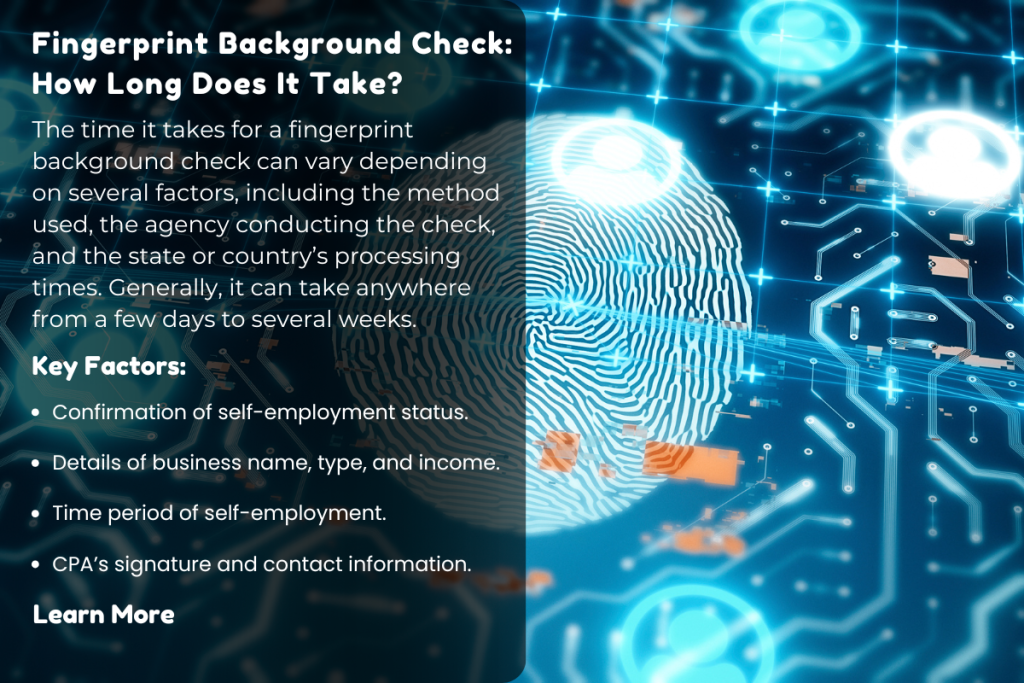
Introduction to Fingerprint Background Checks and Timeframes
Fingerprint background checks are an essential part of the background screening process used across various sectors, including employment, housing, and security clearances. These checks are typically requested to verify an individual’s criminal history or to ensure their suitability for certain positions, particularly those involving security, safety, or trust. In this section, we will explore what a fingerprint background check is, how it works, the factors that affect the time it takes to complete the check, and what you can expect from the process.
What Is a Fingerprint Background Check?
A fingerprint background check is a method used to verify an individual’s criminal history and to screen for any previous arrests or convictions. This check involves the collection of fingerprints, which are then submitted to law enforcement agencies or authorized third-party services for analysis. The fingerprints are compared against databases containing criminal records to determine whether the individual has a criminal history. Fingerprint background checks are commonly required for employment in sensitive industries, for certain government positions, as part of the licensing process for various professions, and in some cases, for immigration purposes.
Unlike name-based background checks, which rely on an individual’s personal information (such as their name, Social Security number, and date of birth), fingerprint checks are generally regarded as more accurate. This is because fingerprints are unique to each individual, offering a higher level of precision and reducing the risk of errors related to common name mismatches.
How Fingerprint Background Checks Work
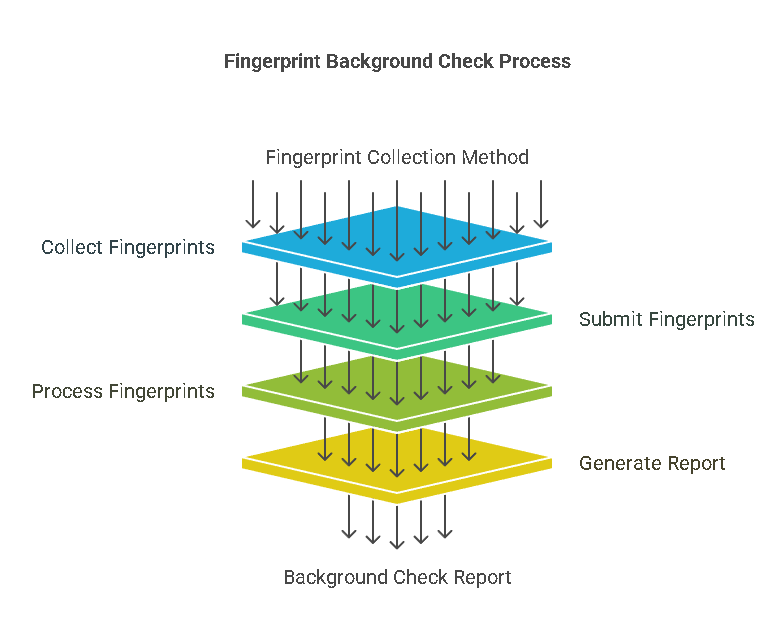
The fingerprint background check process starts with the collection of fingerprints, which can be done in one of two ways: ink-based (traditional) or digital (electronic) fingerprints.
Ink-based prints involve rolling an individual’s fingers on an ink pad and then onto paper, creating a hard copy of their fingerprint impressions. These prints are then sent to the relevant authorities for processing.
Digital fingerprints, on the other hand, are captured using electronic devices that scan and record the fingerprints directly onto a computer system. This method is typically faster than the traditional ink-based method and is becoming the preferred option in many cases.
Once the fingerprints are captured, they are submitted to the relevant authorities. In the United States, the FBI, state law enforcement agencies, or local police departments typically handle the processing of fingerprint checks. Some third-party companies also facilitate fingerprint checks by forwarding the prints to the appropriate agencies.
The authorities will compare the submitted fingerprints against their databases to check for any matching criminal records. The results of this search are used to compile a report, which is then provided to the requester (such as an employer, landlord, or government agency).
Factors Affecting the Time It Takes for a Fingerprint Background Check
Several factors influence how long it takes to complete a fingerprint background check. The most important factors include the method of submission, the agency conducting the check, the volume of requests being processed, and the type of check being performed.
1. Method of Submission: As mentioned, fingerprints can be collected through either ink-based or digital methods. Digital fingerprinting tends to be faster, as the data can be directly uploaded and processed in a more streamlined manner, reducing the time it takes to deliver results. Ink-based fingerprints may require additional time for physical processing and transport.
2. Agency Conducting the Check: Different agencies have varying processing speeds based on their resources and workloads. For instance, an FBI background check may take longer compared to a state or local check due to the larger scope of the national database and the higher volume of requests the FBI handles. State and local agencies, on the other hand, might provide results more quickly due to fewer requests and smaller databases.
3. Backlog or Volume of Requests: At times, agencies may experience a high volume of fingerprint background check requests, leading to delays in processing times. For example, during peak hiring seasons, such as around the holidays, or in certain jurisdictions with high crime rates, background checks might be delayed as the agencies work through the backlog.
4. Jurisdictional Differences: Processing times may vary depending on the state or country in which the fingerprint check is being conducted. For example, an FBI background check, which is a nationwide check, may take longer than a state or local background check. Different states may also have their own procedures and processing times, which can impact the overall timeline.
5. Type of Check: Fingerprint background checks can be used for different purposes, such as criminal record checks, employment background checks, security clearance checks, or licensing. Depending on the complexity and requirements of the check, the time it takes to complete can vary. For example, a check for a high-level security clearance might take longer than a simple employment check due to the depth of the investigation required.
Typical Timeframes for Fingerprint Background Checks
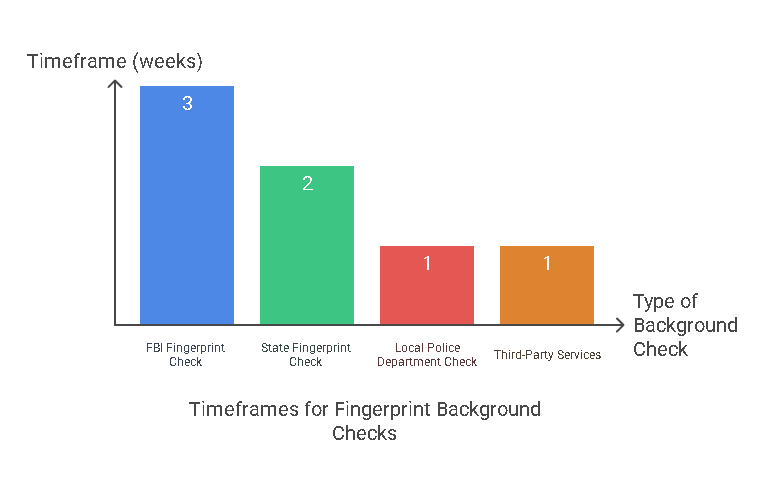
While the exact time it takes to complete a fingerprint background check will vary depending on the factors listed above, here are some general timeframes you can expect:
- FBI Fingerprint Check: Typically, FBI background checks take between 1 to 3 weeks to complete, though in some cases, it can take longer. This is due to the nationwide scope of the database and the volume of requests the FBI handles.
- State Fingerprint Check: A state-level fingerprint background check usually takes about 1 to 2 weeks. However, the timeframe can differ depending on the state’s processing capacity and whether digital or ink-based prints are used.
- Local Police Department Check: A local police department background check tends to be the fastest, often taking a few days to a week. Since these checks are conducted within a specific jurisdiction, the scope is smaller and the processing time is typically shorter.
- Third-Party Background Check Services: Some private companies offer fingerprint background checks by acting as intermediaries between individuals and agencies. These services usually process requests within a few days to a week, depending on the service provider and the agency involved.
Comparison with Other Background Checks
Fingerprint background checks are more thorough and accurate compared to name-based background checks. While name-based checks rely on personal information, fingerprint checks use unique biometric data, ensuring a higher level of certainty. However, fingerprint background checks tend to take longer than name-based checks, which can be completed in just a few minutes if they are conducted using a person’s name, date of birth, and Social Security number.
Fingerprint checks are also more secure, reducing the likelihood of mistaken identity or fraud. They are particularly important in situations where a high level of trust or security is required, such as in law enforcement, healthcare, or roles involving children.
Importance of Accuracy and Thoroughness
One reason fingerprint background checks may take time is that accuracy is paramount. When performing checks for employment, security clearance, or criminal records, it is vital that the results are thoroughly investigated to avoid errors. A mistake in processing, such as a wrong fingerprint match, could lead to significant consequences, such as wrongful denial of employment, security clearance, or legal issues. Therefore, agencies need to ensure the thoroughness and accuracy of their searches, which can take additional time.
This emphasis on precision makes fingerprint background checks more reliable for employers, landlords, and other entities. While they take longer than other types of background checks, the benefits of a more comprehensive and accurate result are often worth the wait.
Understanding the Process and Factors Affecting Time
Fingerprint background checks are essential for ensuring the accuracy of criminal history reports, especially in sensitive positions where trust and security are paramount. In Part 1, we discussed the overall process and the various factors that influence how long it takes to complete a fingerprint background check. Now, we’ll dive deeper into the step-by-step process of obtaining a fingerprint background check, discuss common delays, and explore the best practices for minimizing those delays.
Step-by-Step Process of a Fingerprint Background Check
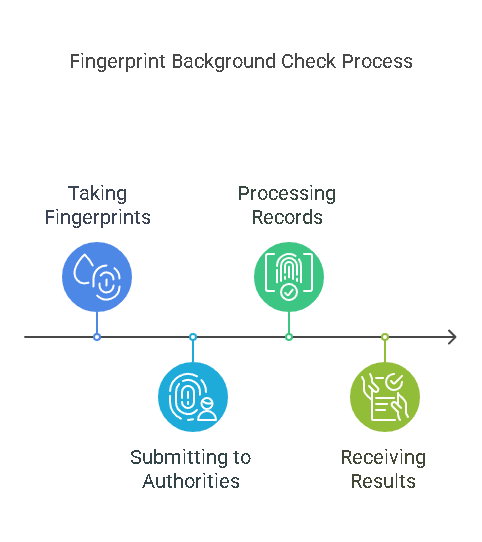
Understanding the steps involved in a fingerprint background check can help applicants and employers streamline the process. Here is a breakdown of the steps:
1. Taking the Fingerprints
The first step in the process is capturing the individual’s fingerprints. This can be done in two ways: ink-based or digital (electronic) fingerprinting.
- Ink-based fingerprinting involves rolling the individual’s fingers on an ink pad and then pressing them onto paper. This method creates physical copies of the fingerprints that need to be sent to the relevant authorities for processing.
- Digital fingerprinting involves using electronic fingerprinting devices to scan the prints and send them directly to a computer system. This method is faster and more efficient than ink-based methods, as the prints can be sent instantly to the relevant agency.
Many service providers now offer both types of fingerprinting, but digital fingerprinting is becoming the more common choice due to its speed and convenience.
2. Submitting Fingerprints to the Correct Authority
Once the fingerprints are captured, the next step is submitting them to the relevant authority for processing. This could be one of several entities, depending on the nature of the check:
- FBI: For national checks, the FBI is typically responsible for processing fingerprint background checks. The fingerprints are sent to the FBI’s Criminal Justice Information Services (CJIS) Division for comparison with their national database.
- State Police or Local Police Departments: For state or local checks, the fingerprints are sent to the appropriate state police department or local law enforcement agency, where they are cross-referenced with state or local criminal databases.
- Third-party services: In some cases, third-party background check companies collect the fingerprints and forward them to the appropriate authority.
3. Processing and Checking Records
Once the fingerprints are received by the relevant agency, the next step is processing. This involves checking the fingerprints against a database of known criminal records. The agency will perform a search to see if the individual has a criminal history.
- National criminal records: If the check is through the FBI, they will search their nationwide database for any criminal records associated with the fingerprints.
- State or local criminal records: If the check is performed at the state or local level, the database will be smaller and only include criminal records within that jurisdiction.
During this stage, the agency may need to verify the information submitted with the fingerprints, such as confirming the individual’s identity or cross-referencing other records.
4. Receiving the Results
Once the search is complete, the background check results are delivered to the requesting party (employer, landlord, government agency, etc.). The time it takes to receive these results depends on the agency processing the check and the type of check being performed.
- Digital submission: Digital fingerprinting allows for faster processing and generally results in a quicker turnaround time.
- Manual submission: Ink-based fingerprints, being a more traditional method, can take longer to process due to the physical handling of records and the need for manual entry.
In some cases, additional checks or clarifications may be needed, which can further delay the processing time.
Delays in the Fingerprint Background Check Process
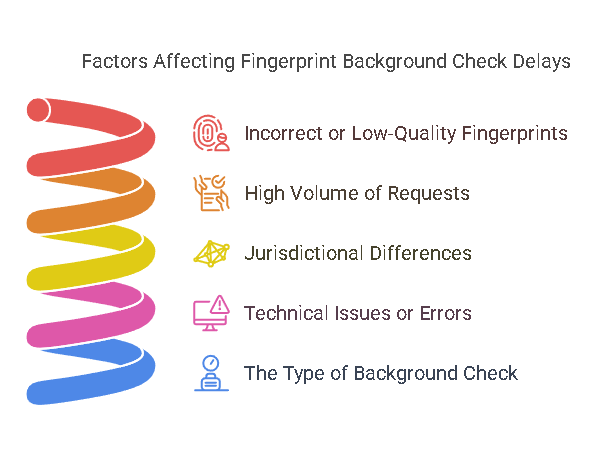
While fingerprint background checks are generally reliable and accurate, there are a number of factors that can delay the process. Here are some of the most common causes of delays and how to avoid them:
1. Incorrect or Low-Quality Fingerprints
One of the most common reasons for delay is the submission of poor-quality fingerprints. If the fingerprints are not clear or legible, the agency may need to ask for resubmission, which adds additional time. To avoid this, it’s essential to ensure that the fingerprinting process is done properly, using the right equipment and technique.
2. High Volume of Requests
During certain periods, such as holidays or peak hiring seasons, the volume of fingerprint background check requests can increase significantly. This can cause a backlog at the agency responsible for processing the check, leading to delays. To mitigate this, it’s important to start the process early and anticipate any seasonal fluctuations in demand.
3. Jurisdictional Differences
The jurisdiction performing the background check can also impact the timeline. State and local agencies may have different processing times based on their workload, resources, and the extent of the check. If you are requesting a national background check, such as an FBI check, the timeframe may be longer than a local one due to the broader scope and database size.
4. Technical Issues or Errors
In rare cases, technical issues such as computer system failures or human errors can result in delays. Ensuring that the fingerprinting process is completed correctly and that all necessary documentation is provided can help prevent this.
5. The Type of Background Check
Different types of fingerprint background checks may also require different processing times. For example, checks for high-security positions or government clearances may involve a more detailed investigation and thus take longer to complete.
Table: Comparison of Fingerprint Background Check Timeframes
Below is a table that compares the timeframes for fingerprint background checks based on various factors such as method of submission, agency conducting the check, and the type of check being performed.
| Factor | Timeframe | Comments |
|---|---|---|
| Method of Submission | ||
| – Ink-based Fingerprints | 2-4 weeks | Physical submission; slower due to manual processing |
| – Digital Fingerprints | 1-2 weeks | Faster processing; digital submission speeds up turnaround times |
| Agency Conducting the Check | ||
| – FBI (National Check) | 1-3 weeks | Nationwide search; can be delayed during high-volume periods |
| – State Police/Local Police Check | 1-2 weeks | Localized check; generally faster than federal checks |
| Volume of Requests | ||
| – High Volume/Peak Periods | 2-3 weeks | Processing delays due to increased demand during hiring seasons or holidays |
| – Low Volume/Off-Peak Periods | 1 week or less | Faster turnaround during off-peak periods or when the agency has fewer requests |
| Type of Check | ||
| – Employment Background Check | 1-2 weeks | Generally quicker due to fewer records needing verification |
| – Security Clearance Background Check | 3-4 weeks | More thorough checks, especially for high-security positions or government roles |
| – Criminal Record Check | 1-2 weeks | Quick check for past criminal activity |
Best Practices for Employers and Applicants
To speed up the fingerprint background check process and avoid delays, both employers and applicants can follow these best practices:
For Employers:
- Ensure Clear Instructions: Provide applicants with clear instructions on where and how to submit their fingerprints, including whether they need ink-based or digital prints.
- Choose the Right Agency: Select a reliable agency or third-party service that can handle fingerprint checks efficiently and in compliance with legal requirements.
- Anticipate Delays: Start the process early, especially for high-security positions or roles with strict deadlines.
For Applicants:
- Check Fingerprint Quality: Ensure that the fingerprints are captured clearly and accurately, especially if using the ink-based method.
- Complete All Necessary Documentation: Submit all required documents with the fingerprint submission to prevent delays caused by missing information.
- Be Patient: Understand that some delays may be outside of your control, such as high volumes of requests or technical issues.
PreciseHire’s Expertise in Fingerprint-Based Background Checks
PreciseHire plays an essential role in helping businesses and organizations navigate the complexities of background checks, including fingerprint verifications. The company provides efficient, reliable, and legally compliant screening services to ensure businesses meet industry standards and regulations. With its expertise in background checks, including fingerprint-based checks, PreciseHire helps streamline the process, offering fast results while ensuring the privacy and confidentiality of applicants. Whether for employment, tenant screening, or other purposes, PreciseHire supports clients in maintaining a smooth, accurate, and legally sound background screening process.
Legal Aspects, FAQs, and Conclusion
Fingerprint background checks are more than just a tool for verifying criminal histories; they are also governed by various legal considerations. Understanding the legal landscape surrounding fingerprint background checks is crucial for both employers and applicants. In this section, we will explore the legal implications of fingerprint background checks, answer frequently asked questions, and provide a summary of the key takeaways.
Legal Aspects of Fingerprint Background Checks
The legal implications of fingerprint background checks can be complex, involving federal, state, and local regulations. Below are the key legal aspects to consider:
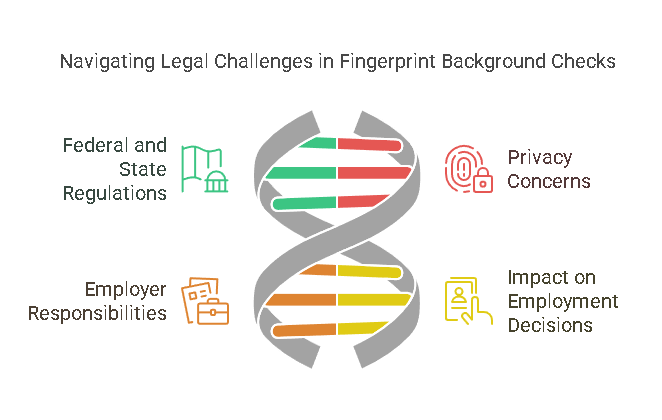
1. Federal and State Regulations
Both federal and state laws regulate the use of fingerprint background checks, particularly when it comes to employment and certain high-security positions.
- Federal Laws: Under the Fair Credit Reporting Act (FCRA), employers must obtain written consent from applicants before conducting background checks, including fingerprint background checks. Additionally, the FCRA requires that employers provide applicants with a copy of the background check results if requested.
- State Laws: Many states have specific regulations that govern how background checks, including fingerprint checks, are conducted. For example, some states may limit the use of criminal records in hiring decisions, especially for minor offenses or for applicants seeking jobs unrelated to criminal justice. Employers must be aware of these state-specific rules to ensure compliance.
Certain professions, such as those in healthcare, law enforcement, and education, often require fingerprint background checks as part of a mandatory licensing or certification process. These industries are subject to additional regulations that may include more thorough checks and specific timelines for completion.
2. Privacy Concerns
Privacy is a significant concern when it comes to fingerprint background checks. Since fingerprints are biometric data, they are considered sensitive personal information. The use of this data is subject to privacy laws designed to protect individuals’ rights.
- Consent: In most cases, applicants must give consent before their fingerprints can be submitted for a background check. This consent should be informed, meaning applicants must be made aware of what the check entails, who will conduct it, and how the information will be used.
- Data Storage and Access: Agencies that process fingerprints must store and handle fingerprint data securely. Only authorized personnel should have access to this data, and it must be disposed of appropriately once it is no longer needed.
- Disputing Results: Applicants have the right to dispute incorrect information found during a fingerprint background check. If an applicant believes that their fingerprint check results are inaccurate, they can request a re-investigation or provide additional documentation to clarify the discrepancy.
3. Employer Responsibilities
Employers who receive criminal background check results through fingerprinting must handle the information responsibly. Employers are required to follow certain legal steps when using criminal history information to make employment decisions.
- Ban the Box Laws: Many states and cities have enacted “ban the box” laws, which prohibit employers from asking about an applicant’s criminal history until later in the hiring process. These laws are intended to prevent discrimination based on past criminal records and give applicants a fair chance at employment.
- Consideration of Criminal Records: Employers must carefully consider the nature of any criminal offenses revealed during a fingerprint background check. For example, they may be required to consider how long ago the offense occurred, whether it is relevant to the job, and whether the applicant has shown evidence of rehabilitation.
- Confidentiality: Employers must also ensure that the information contained in a fingerprint background check is kept confidential and shared only with individuals who have a legitimate need to know.
4. Impact on Employment Decisions
Fingerprint background checks can significantly impact employment decisions. For employers, these checks provide a reliable and accurate way to assess the trustworthiness of potential employees, particularly in positions of responsibility. However, the use of fingerprint background checks must be done in compliance with applicable laws to avoid discrimination and ensure fair treatment for all applicants.
For applicants, a fingerprint background check may uncover past criminal records that could affect their eligibility for certain jobs. However, depending on the nature of the offense, the applicant’s rehabilitation efforts, and the laws in their state, they may still be eligible for employment.
Frequently Asked Questions (FAQs)
What is the difference between a fingerprint background check and a regular background check?
A fingerprint background check uses biometric data (fingerprints) to search criminal databases for records. A regular background check, on the other hand, may use personal identifiers like name, date of birth, or Social Security number to conduct a search for criminal history or other records.
How long does it take for an FBI fingerprint background check to be completed?
On average, an FBI fingerprint background check can take between 1 to 3 weeks. The timeline can vary depending on factors such as the method of submission (digital or ink), the volume of requests, and whether there are any discrepancies in the records.
Can my fingerprint background check be expedited?
Yes, some agencies and third-party services offer expedited fingerprint background check options for an additional fee. This can help speed up the process, particularly for urgent situations like job applications or security clearances.
What can cause delays in the fingerprint background check process?
Common causes of delays include poor-quality fingerprints, a high volume of background check requests, jurisdictional differences, and discrepancies in the criminal record. Additionally, if manual processing is required, it may take longer than digital submission.
How do I know if my fingerprint background check was successful or failed?
Once the background check is processed, you or the requesting party will receive the results. If there is an issue with the fingerprint submission (e.g., illegible prints), you may be asked to submit your fingerprints again. The results should indicate whether there are any criminal records associated with the fingerprints.
Conclusion
Understanding the fingerprint background check process is crucial for both applicants and employers. The time it takes to complete a fingerprint background check depends on various factors, including the method of submission, the agency conducting the check, and the volume of requests. Legal considerations are also an important part of the process, ensuring that fingerprint checks are conducted ethically and in compliance with privacy and anti-discrimination laws.
Employers and applicants alike should be aware of the legal framework surrounding fingerprint background checks and how it impacts employment decisions. By following best practices and being aware of potential delays, both parties can ensure a smoother, more efficient process.
For businesses and individuals seeking assistance with background checks, PreciseHire offers streamlined services to help with fingerprint background checks and other types of employment screening. PreciseHire ensures that background checks are conducted efficiently, accurately, and in compliance with all legal requirements, helping businesses make informed decisions while safeguarding applicants’ privacy and rights.
